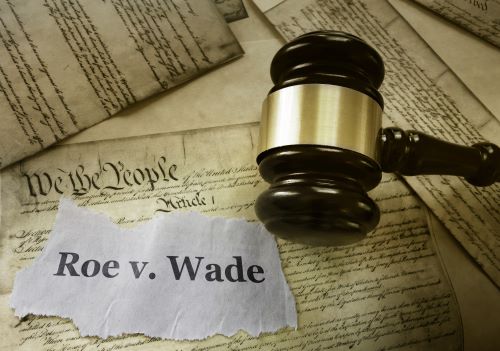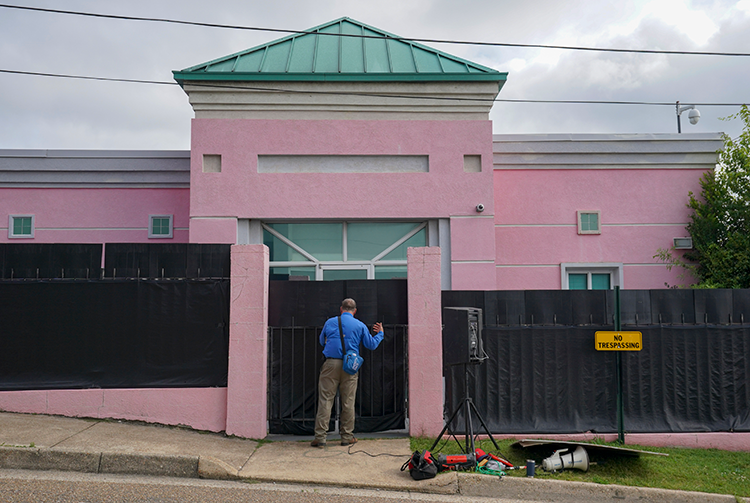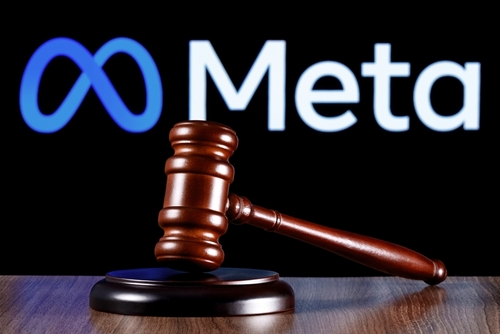Abortion ruling by Supreme Court sparks closer scrutiny of substantive due process

Image from Shutterstock. Photo by Bonnie Jo Mount/The Washington Post via Getty Images.
The U.S. Supreme Court’s decision last week overruling landmark decisions on abortion rights set off legal, political and social earthquakes. Justice Samuel Alito’s majority opinion largely tracks the leaked draft that was published in early May, so its 79 pages were less of a surprise as to their content, even if the court’s actual release of the decision was a gut punch to abortion-rights supporters and a cause for abortion opponents to rejoice.
But with the official release on June 24 of Dobbs v. Jackson Women’s Health Organization, the public encountered concurring opinions and a joint dissent in for the first time. Attracting the most attention was a concurrence by Justice Clarence Thomas suggesting that high court precedents on contraception, same-sex sexual intimacy and same-sex marriage should be reconsidered.
Those rights, along with the right of a woman to terminate her pregnancy that the court just struck down, were all based on the principle of substantive due process, in which courts recognize certain fundamental rights that are unenumerated in the U.S. Constitution.
Thomas made a bold statement that “in future cases, we should reconsider all of this court’s substantive due process precedents,” including 1965’s Griswold v. Connecticut (contraception), 2003’s Lawrence v. Texas (same-sex intimacy), and 2015’s Obergefell v. Hodges (same-sex marriage).
“Because any substantive due process decision is ‘demonstrably erroneous,’ … we have a duty to ‘correct the error’ established in those precedents,” Thomas said, quoting some of his own earlier opinions.
Alito, in the majority opinion that Thomas joined in full, would not go as far as Thomas. His opinion rejects the 1973 Roe v. Wade decision recognizing a right to abortion as “’egregiously wrong’ on the day it was decided.” Any right not enumerated in the Constitution must be “deeply rooted in this nation’s history and tradition” and “implicit in the concept of ordered liberty,” Alito said, quoting the court’s 1997 decision in Washington v. Glucksberg, which rejected a substantive due process right to assisted suicide.
Alito said, “We emphasize that our decision concerns the constitutional right to abortion and no other right. Nothing in this opinion should be understood to cast doubt on precedents that do not concern abortion.”
Jane S. Schacter, a professor at Stanford Law School, says Alito embraces one distinct line of substantive due process doctrine from the Glucksberg case that is divergent from views expressed by Justice Anthony M. Kennedy in his majority opinions in Lawrence and Obergefell: that history and tradition guide the inquiry over the contested right, but views of the time of the adoption of the 14th Amendment in 1868 do not “rule the present.”
“These two lines had fundamentally different approaches to liberty,” Schacter says. “The Dobbs opinion, though, is very categorically saying the court is going with the Glucksberg version.”
 Related article from ABAJournal.com: “ABA supports reproductive choice, opposes prosecution for having an abortion, ABA president says”
Related article from ABAJournal.com: “ABA supports reproductive choice, opposes prosecution for having an abortion, ABA president says”
A long history of debate over substantive due process
The principle of substantive due process traces back to the Magna Carta. It also was the subject of robust debate among the justices in the mid-20th century before becoming the basis for incorporating, or applying, to the states key provisions of the Bill of Rights and becoming the basis for such privacy-based rights as contraception, sexual intimacy and same-sex marriage.
Evan Bernick, a law professor at Northern Illinois University in DeKalb, Illinois, who has written about substantive due process, says conservative skepticism of the principle was championed by the late Chief Justice William H. Rehnquist (who wrote the Glucksberg opinion) and the late Justice Antonin Scalia.
“They saw substantive due process as a terrible thing, as an excuse for judges to just make things up,” Bernick says.
He says that Thomas, in his Dobbs concurrence, is recognizing that Alito is applying that skepticism to abortion rights, but then Thomas is saying “‘let’s not mince words. Let’s just reject substantive due process altogether and pull off the Band-Aid.’”
Several legal scholars said they doubted there was much appetite among the court’s conservatives to totally re-examine substantive due process doctrine. (None joined Thomas’ separate concurrence.)
Nancy Marcus, a legal writing professor at California Western School of Law in San Diego, says getting rid of substantive due process might come back to bite conservatives for some of the issues or ideals they often favor, such as limited government authority on vaccines and mask mandates or parental rights to control the upbringing of their children.
But several left-leaning professors said they were not putting much stock in Alito’s assertions that the majority opinion’s substantive due process analysis was limited to the abortion rights at issue in Dobbs.
“No, I don’t believe it for a second,” Marcus says. “I take it with a grain of salt.”
For one thing, contraception also arguably affects “potential life,” she says, “so there’s no distinction on that under Alito’s analysis.”
While Alito in the majority opinion and Kavanaugh in his concurrence assert that other precedents are not at risk, those recent precedents “are all built on the same building blocks,” Marcus says.
She cites the joint dissent by Justices Stephen G. Breyer, Sonia Sotomayor and Elena Kagan, which argues that Thomas is “not with the program” of the majority, meaning that he (in the dissenters’ view) believes those precedents are not up for reconsideration only with the Dobbs opinion itself.
“So at least one justice is planning to use the ticket of today’s decision again and again and again,” the joint dissent says.
Bernick says the best way to think about Alito’s assurance is to look back to when Kennedy, in the Lawrence majority opinion in 2003, said the decision “does not involve whether the government must give formal recognition to any relationship that homosexual persons seek to enter.”
Scalia, in his dissent in Lawrence, said, “Do not believe it,” and foretold the court’s eventual recognition of a constitutional right of same-sex marriage.
Bernick says he views Alito’s disclaimer as “a desire to minimize public outrage.” He does not think that if a state sought to prohibit a particular form of contraception and the case made its way to the high court, the justices would feel constrained by the language in Dobbs.
Something short of overruling precedents could be significant
Schacter agrees, saying that “the shelf life of those assurances may not be long.”
“In the near term, I wouldn’t expect them to do anything with those precedents,” she says. “In the longer term, I would say all bets are off.”
Erin E. Murphy, an appellate lawyer and adjunct professor at Georgetown University Law Center, notes that Thomas does suggest that the rights involved in Griswold, Lawrence, and Obergefell might be available under the 14th Amendment’s clause barring states from abridging the “privileges or immunities” of U.S. citizens.
“I think something that gets a bit lost is that he could not be clearer that what he was saying in his concurring opinion … is that he believes those decisions [Griswold, Lawrence, and Obergefell] are wrong as a matter of substantive due process,” Murphy said at a Georgetown Law webinar Wednesday about the Dobbs decision. “It’s essentially the very next breath of the opinion in which he says even he is recognizing it is a very different question whether they might be right as a matter of some other constitutional analysis.”
Murphy, a former law clerk to Roberts who indicated she supports the outcome in Dobbs, said Thomas’s critique of substantive due process is one he has been making for at least 12 years and so is “nothing new.”
“More to the point,” she said, “that is an opinion for one member of the court.”
Bernick, Marcus, and Schacter all said they doubted that Thomas would conclude that the privileges or immunities clause would encompass LGBTQ rights or a right to contraception.
Reva Siegel, a professor at Yale Law School who has written extensively on abortion rights, gay rights and religious exemptions, says she is concerned that the discussion revolves around outright overruling of precedents such as Griswold, Lawrence, and Obergefell without paying attention to smaller steps that might result.
“The court can do a tremendous amount of damage short of overruling a right,” she says. “It can allow government to regulate a right in a significant way, or allow another right to trump them, such as the right of religious liberty.”
The court is “of course not going to get rid of all substantive due process rights,” Siegel says, noting that even the incorporation of an expanded view of gun rights in the court’s recent Second Amendment decision is reliant on substantive due process. “But there are groups of people who are marginalized in the political process, and the Supreme Court is weakening substantive due process rights that protect their equal membership in our democracy.”
See also:
ABAJournal.com: “Supreme Court overrules Roe v. Wade and the right to abortion”
ABAJournal.com: “Litigation over abortion bans begins at state level; judges block laws in 3 states”
ABAJournal.com: “States can’t restrict abortions outside their borders, ban abortion pills based on FDA disagreement, AG Garland says”



